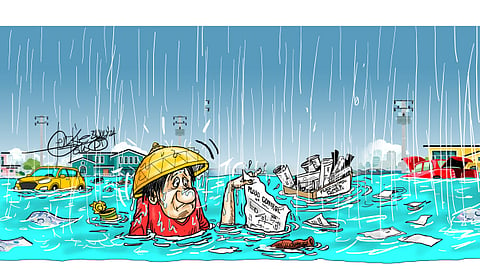
- NEWS
- the EDIT
- COMMENTARY
- BUSINESS
- LIFE
- SHOW
- ACTION
- GLOBAL GOALS
- SNAPS
- DYARYO TIRADA
- MORE

The massive flooding last 24 July has become a serious concern for the current administration, which is now asking the question long asked by the populace — where did the billions of pesos for yearly anti-flood projects go?
The query occupied the mind of President Ferdinand Marcos Jr. when he convened a briefing to come up with a response to the devastation caused by typhoon “Carina”, mainly In Metro Manila.
The helplessness of the capital region against the deluge came two days after it was mentioned in the State of the Nation Address that more than 5,500 flood control projects had been completed.
The President thus ordered a review of all flood control projects to stop the government from throwing money down the gutter to control the buildup of water whenever there is a heavy downpour.
Due to the unpredictable weather, it does not take a typhoon to submerge the nation’s capital.
“They have many flood control measures and yet we have these floods. We have to relook. We have to reexamine some of the designs of our flood control measures,” the Chief Executive said.
In the proposed 2025 budget, P257 billion is allotted to flood control, which is higher than the allotment in this year’s budget. The amount is far bigger than the funds earmarked for new classrooms, hospitals and irrigation.
Flood control was larger than the entire agriculture budget of P181 billion for 2024, according to Senate President Chiz Escudero.
The money should have been used for clearing drains and dredging rivers but this apparently did not happen considering the predictable flooding.
Nebulous items in the budget are where most of the kickbacks happen in place of the outlawed Priority Development Assistance Fund (PDAF).
Flood control projects and farm-to-market roads are the preferred projects for legislators to generate commissions.
The Supreme Court has prohibited the insertion of projects after the drafting of the General Appropriations Act, thus most of the sources of pork barrel are included in the executive branch’s proposals to get around the SC declaration of the PDAF as unconstitutional.
Thus, the number of flood control projects ballooned even if they are not a priority under the Medium-Term Philippine Development Plan, which is the blueprint for growth until 2028.
The projects are not even seriously implemented as the Commission on Audit (CoA) found that anti-flood projects the Metropolitan Manila Development Authority (MMDA) was supposed to implement were mostly delayed.
The CoA identified 33 projects under the Metropolitan Manila Flood Management Project that were delayed more than two years.
The MMDA’s excuse was that the projects from 2018 to 2022 were affected by the Covid-19 lockdowns and the election ban.
Yet, those who defended the flood control projects during the hearings in Congress underlined the urgency of the infrastructure because of the recurring heavy downpours.
Delays in projects that have loan allocations incur so-called commitment fees that have to be paid while the loans are idle.
From 2018 to 2022, MMDA’s Metropolitan Manila Flood Management Phase 1 Project incurred over P27 million in such fees.
The amount, which were penalties for the delays, could have bought provisions for Filipinos affected by the harsh weather instead of being swept to the gutters along with the floods.
President Marcos came up with a good solution through his proposed centralized water management program to put all the different flood mitigation projects under a systematic effort to save the government money and win the battle against the ever-cruel flash floods.
It is monstrous for public officials to exploit anti-flood programs for self-gain, which they obtain in exchange for lost lives and properties.
